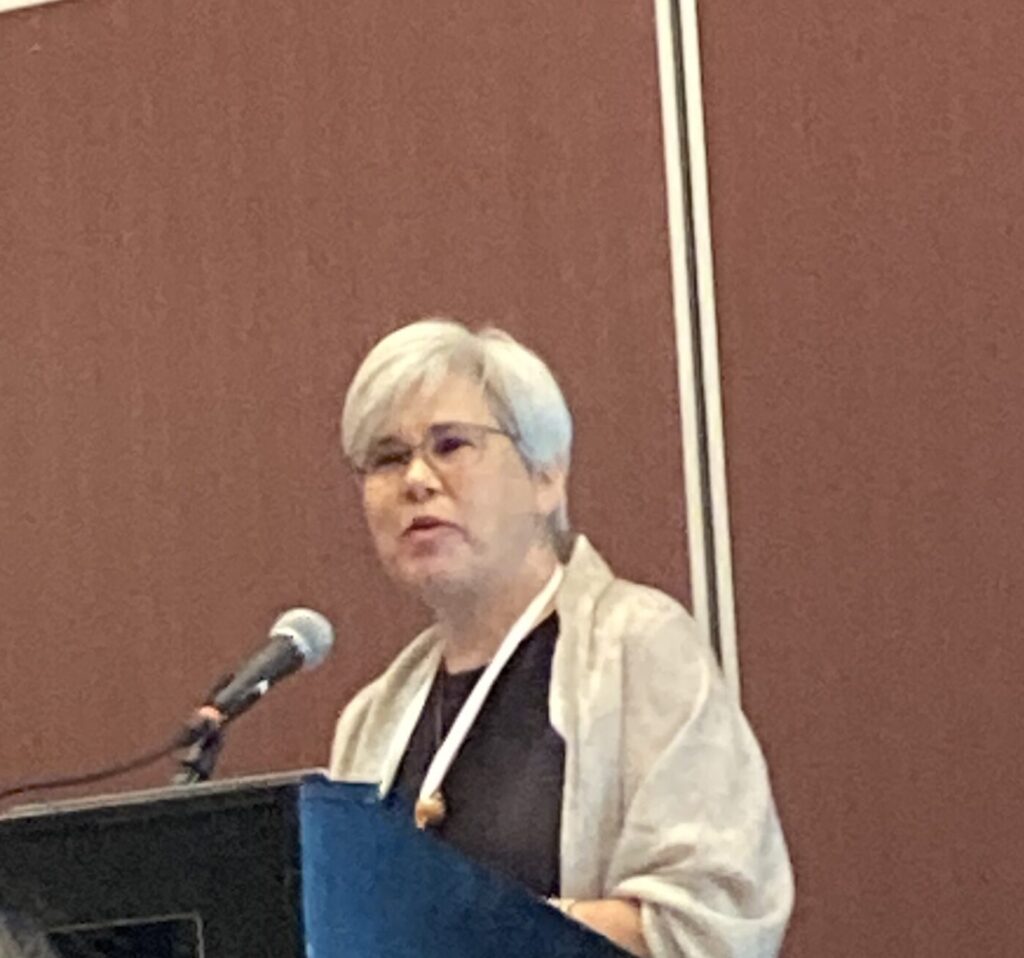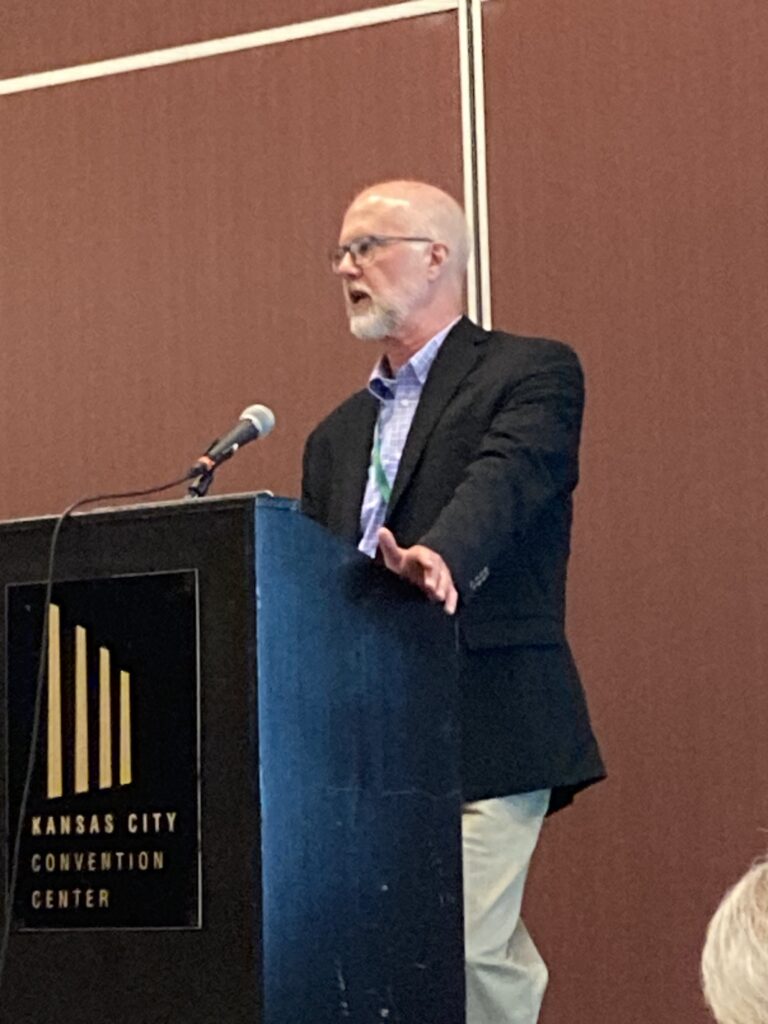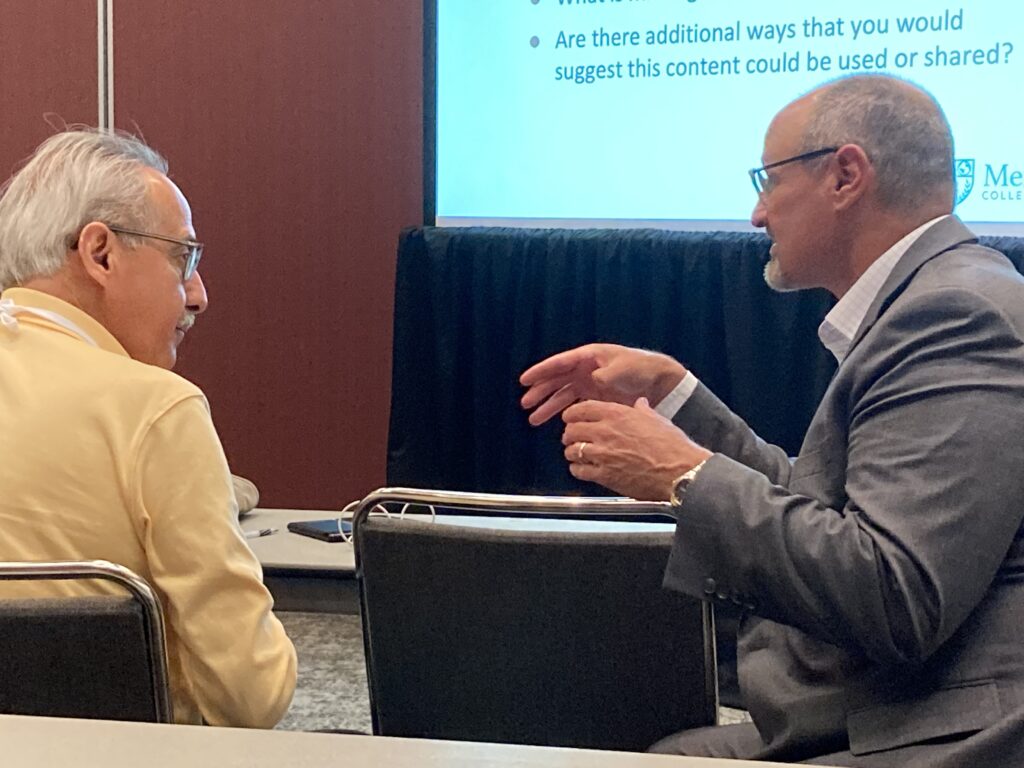by Jolene VonGunten for Mennonite Education Agency
“It is no longer true that a super majority of our students or faculty are Mennonite,” said Dr. Rebecca Stoltzfus, President of Goshen (Ind.) College, on Thursday afternoon at MennoCon23. Although the six higher education institutions that affiliate with Mennonite Church USA (MC USA) are “passionately Christ-centered and Anabaptist,” more and more students and staff do not understand what that means.

Dr. Stoltzfus spoke on behalf of the Mennonite Higher Education Association (MHEA), which includes:
- Anabaptist Mennonite Biblical Seminary, Elkhart, Ind.
- Bethel College, North Newton, Kan.
- Bluffton (Ohio) University
- Eastern Mennonite University, Harrisonburg, Vir.
- Goshen College
- Hesston (Kan.) College
Stoltzfus acknowledged three other presidents in the audience: Dr. Jon Goering of Bethel College, Dr. Jane Wood of Bluffton University, and Dr. Susan Schultz Huxman of Eastern Mennonite University.
The MHEA presidents relate to MC USA through the Mennonite Education Agency (MEA), explained Stoltzfus, which supports higher education and preschool through grade 12 schools in the Mennonite Church and Hispanic Ministries programming. MEA helped develop the MHEA consortium “to partner with the church and to serve as missional centers by providing a Christ-centered, value-laden educational formation that shapes graduates to become leaders for God’s reconciling mission in church and society, both locally and globally,” according to the group’s Statement of Arrangements.
Students are increasingly representing diverse faith backgrounds, and a growing number claim no faith at all.
“We have both an obligation and an opportunity to express Anabaptist faith to the thousands of children and youth and young adult and adult learners who we serve and whom our campuses touch each year,” she said.

About 18 months ago, the six presidents came together with a vision to provide leadership and shared resources to teach Anabaptism to students and employees at Mennonite colleges and universities: the Anabaptist Collaborative Course. This past May, content creators from each of the six institutions gathered at Goshen College for a two-day Course Creation Workshop. This workshop was sponsored by the Marpeck Fund, whose mission is to strengthen cooperation among the Mennonite institutions of Higher Education in the U.S. and Canada. Dr. Robert Milliman, Vice President for Academic Affairs at Bethel College, served as liaison between the project and the Marpeck Fund. He described the workshop as “epic” to behold.
As the faculty worked in teams to develop the learning goals and objectives for the course modules, the groups experienced giving and receiving feedback in a collaborative and “marvelous” way. Dr. Milliman shared some of the participants’ comments that confirmed his observations. “There has been openness and cooperation instead of anyone insisting on getting their own way,” said one participant. Another reflected, “Collaboration is important to what we say we believe. We don’t do enough of it.”
In authentic Mennonite style, Milliman seemed just as excited by the process as the outcome. “One of the reasons why the Marpeck Fund was established was to bring about collaboration amongst the faculty at various institutions. I saw it happen and I was really, really impressed and found it to be a great encouragement,” he said.
Out of the Course Creation Workshop, the content creators developed a digital curriculum in six learning modules:
- God, Jesus, and the Holy Spirit
- The Bible
- Historical Background
- The Church
- Peace & Justice
- Hospitality, Service, and Mutual Care
The modules would have a flexible, accessible format, and would target a “novice” audience of students and employees without Anabaptist backgrounds or understandings, Milliman explained. Each institution will need to develop some customization to fit its unique context.
Faculty from sister institutions in Canada – Conrad Grebel University, Waterloo, Ont., and Canadian Mennonite University, Winnipeg, Man., – will provide peer review, and Bethel College is preparing to launch a pilot program this fall.
Within three years, the hope is to extend the curriculum to a national audience, Stoltzfus said.
Stoltzfus and Milliman credited and honored the content creators, several of whom were present. Participants included:
- Jamie Pitts and Jackie Wyse-Rhodes from Anabaptist Mennonite Biblical Seminary
- Peter Goerzen and Mark Jantzen from Bethel College
- Chalsi Campbell and Randy Keeler from Bluffton University
- Sarah Bixler and Shannon Dycus from Eastern Mennonite University
- Michelle Blank and Regina Shands Stoltzfus from Goshen College
- Nick Ladd from Hesston College
Stoltzfus used the remainder of the seminar time to invite questions and feedback from the audience, many of whom represented the six institutions, including several recent graduates.

“You all are our Anabaptist community that we represent in this work as we communicate to our students and our employees. One of the main purposes of this time is to really hear from you,” she said.
The response from the audience was affirming and encouraging. One area conference minister invited the schools to look to local congregations for real-world examples and experiences of Anabaptism. “How can local congregations be helpful to your process?” she asked. “There are embodied examples in the local communities. We want to be a resource to what you’re doing and to provide stories and context.”
This is why the Mennonite Higher Education Association wanted to bring this seminar to MennoCon, Stoltzfus said. To receive counsel and feedback from our Anabaptist community.

